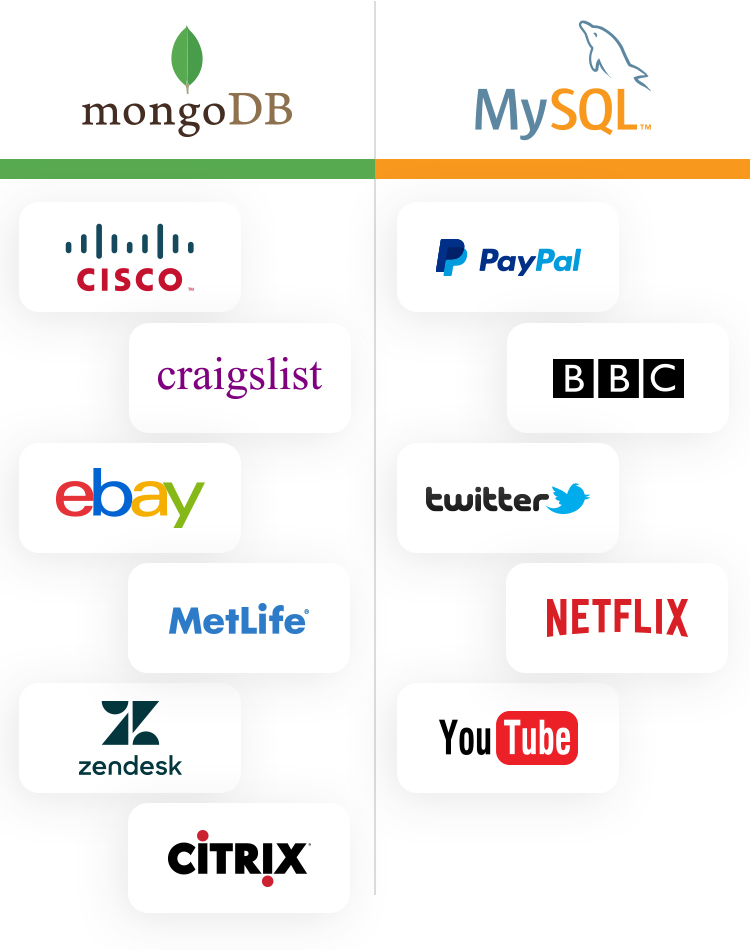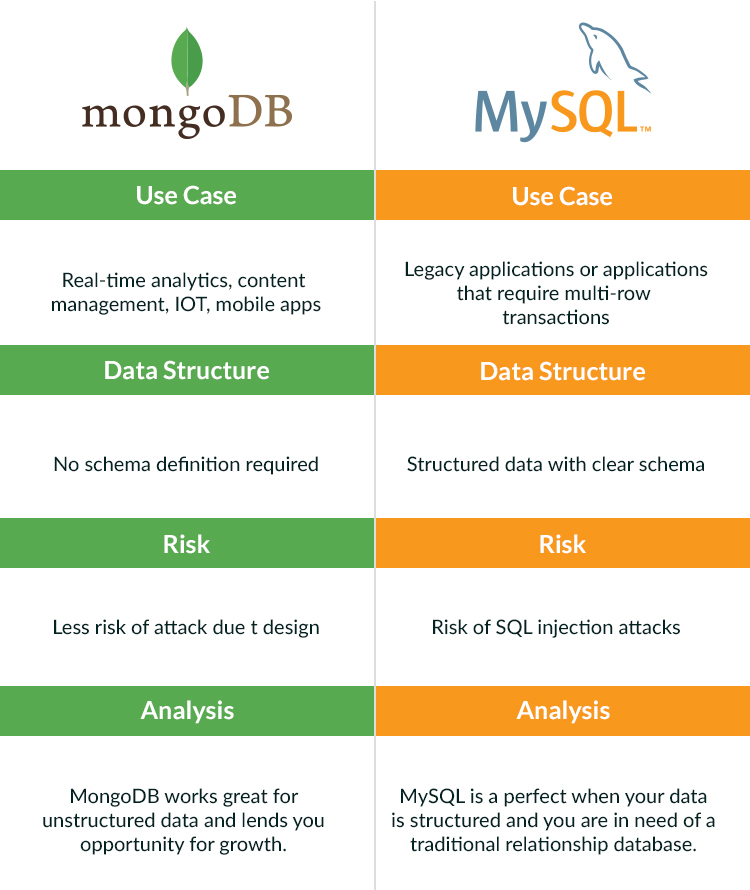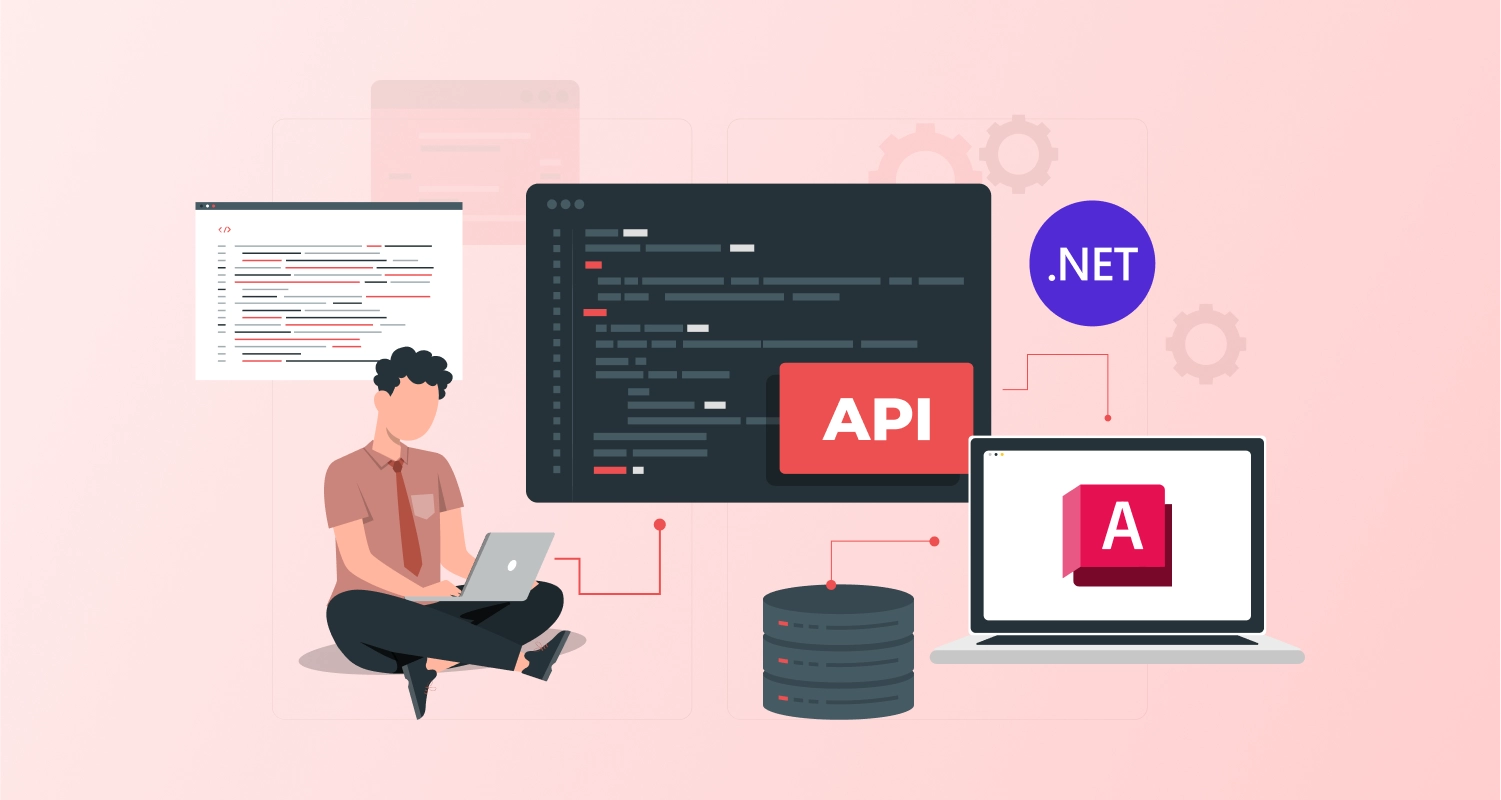Whether you are considering database technology for a mobile app or a large scale software solution, the choice is limited to two main databases. Companies needing a robust relational database at a cheap cost mostly prefer the MySQL database. It stands as one of the most commonly used databases by any development company and projects to this day. But times are changing fast with the exponential growth and variety of data. As the data is continuing to be more diversified, multifaceted and voluminous, non-relational databases like MongoDB are gaining popularity.
This has given rise to the tremendous competition between two database technologies, respectively MySQL and MongoDB. This also made it really challenging for the companies to have a clear choice between the two. This is precisely the reason why we are here to make a detailed comparison between the two databases.
MySQL vs MongoDB: Who Uses What?
On both sides, there are several formidable and industry-leading names. Here is a brief list of enterprises using MySQL and MongoDB.
Introduction To MySQL
MySQL as a relational database is a veteran and is there in the IT scene from 1995. It went through great evolution over the years. Some of the organizations using MySQL include the following.
- YouTube
- Netflix
- Spotify
- US Navy
- NASA
- Walmart
- Paypal
Introduction To MongoDB
MongoDB is a relatively new non-relational database that started its journey from 2009 and in quick time has become hugely popular. Some of the leading and well-known organizations using MongoDB include the following.
- Klout
- Citrix
- T-Mobile
- Zendesk
- Sony
- Hootsuite
- SurveyMonkey
- MuleSoft
- Foursquare
- InVision
Let us now explain the key differences and pros and cons of two databases in regard to the key qualities.
Productivity of the Developers
When comparing the performance attributes and productivity-boosting elements between the two databases, MongoDB seems to have the edge. MySQL is less productive as the web developers experience a slower pace of development with this database. The slower pace of MySQL results from the rigid model consisting of a table structure.
In contrast, by working with flexible data like that of the JSON files, MongoDB ensures a faster pace. By documenting the data map in object-oriented programming language MongoDB allows easy visualization of the entire app data within the database.
Flexibility of the Schema Design
When it comes to developer-friendly Schema design, again MongoDB easily gets ahead of MySQL. Without having any relationship the documents can be stored within a collection as preferred by the developer.
Querying
This is where both MongoDB and MySQL stand head to head without giving any edge to each other. While MySQL operates queries using structured SQL language MongoDB uses any of the JSON based operators.
Data Relationship
When it comes to establishing a data relationship, MySQL is automatically the first choice as it supports join operations. This allows MySQL users to get access to the data across tables by using a single statement. In contrast, MongoDB doesn’t support join operation but it can accommodate multifaceted data.
Data Management Efficiency
MySQL has the imposing restriction of relational structure that cannot allow all types of data. In contrast, MongoDB is capable to manage staggering volumes of data without any restrictions. It allows users to query keeping workload and performance in mind.
Database Structure and Deployment
The structure of the MySQL database is made up of tables and the query language SQL is used to access the data. For defining the structure of the database it uses a design schema that requires the rows to have a similar structure inside the table. The data values are basically represented by the types of data.
In contrast, the MongoDB database allows storing the data in JSON like format. This obviously ensures higher query speed and performance of the database. By allowing to store all types of data with different relations in one place, it rules accessibility by using only query language. Without the absence of schema, developers can use the database without giving any regard to the data relationship.
Optimizing the Index
For quick access to data both the database use indexing. But there are differences of behavior when indexes are not found or defined.
With MySQL, in case the index is not defined the complete table will be scanned by the database engine. In the same situation with MongoDB, the scanning will take place for every single document within a collection in order to find the one matching the query.
Replication or Clustering
With MySQL the master-slave and master-master replication rule dominate. MongoDB, on the other hand, offers inbuilt replication, sharding, and auto-elections features. These features make MongoDB more versatile and flexible. For example, the auto-elections feature allows developers to make a secondary database start automatically in case the primary one fails. Sharding, on the other hand, allows horizontal scaling. These methods cannot be put into practice with MySQL.
MongoDB also offers another edge over the MySQL database. By using replica sets it is capable to create several copies of the same data. Every piece of data in the original or replica set can play the role of a primary or secondary source of data as per the context. Only the read and write operations are done on the primary data set.
Which Database Is Right For Your Business?
Finally, we need to reply to the obvious question. Which database suits your requirements? None of these database technologies fit all use cases and enterprise IT fields. Let us explain this in simple terms.
When You Should Choose MongoDB?
- Applications that need quicker data availability in spite of the volume and variety of data.
- Applications needing fast-paced and automatic data recovery.
- Apps working with unstable schema design that needs to be updated frequently at a lower cost.
- Cloud-based apps and services will find the native and scalable architecture of MongoDB more helpful.
When You Should Choose MySQL?
- For startups that don’t expect the database to scale up a lot.
- Services working with stable schema design and a data structure that is not likely to change for a long time.
- Services looking for optimum database performance at a very low budget.
- Services giving optimum priority to data security than anything else.
Conclusion
So, in all considerations, MongoDB seems to be more dynamic, scalable, performance-driven and versatile. On the other hand, MySQL is more secure and stable. Both can be suitable for different types of services with typical database requirements.









